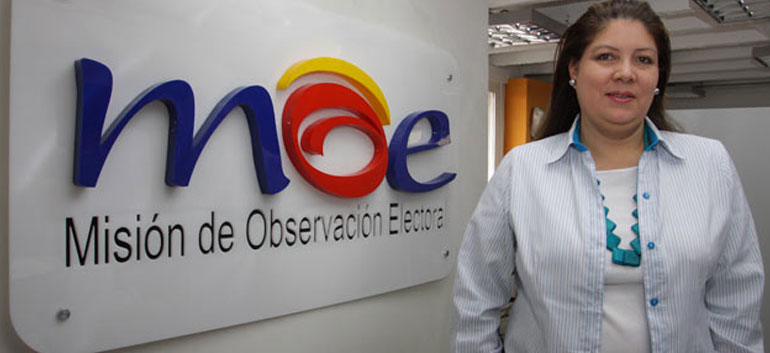Colombia will see its “first elections completely in peace” this coming Sunday when citizens take to the polls to elect their president for the next four years, says the director of the country’s independent electoral observers.
Candidate profiles
Full election coverageElection polls |
While Alejandra Barrios, director of Colombia’s Electoral Observation Mission (MOE), agrees with most critics that this has been one of the dirties campaigns in recent history, the electoral watchdog leader is confident that the country’s presidential elections will go smoothly and peacefully on May 25.
“Undeniably, this campaign is like what we saw in [past elections], where there was much tension due to accusations between candidates winning because of illegal activities,” said Barrios referring to President Juan Manuel Santos facing allegations of connections to drug money and lead opposition candidate Oscar Ivan Zuluaga defending himself in light of an incriminating wiretapping video.
MORE: Political uproar over 2011 Govt. negotiations with drug traffickers
MORE: Zuluaga directly involved with illegal wiretapping, caught on video
“But this Sunday, the polarization of this political campaign is going to be translated into higher levels of voting,” the MOE director affirmed.
Barrios explained to Colombia Reports that she expects Sunday to go well, emphasizing that votes can and will be “adequately registered,” political parties have now been familiarized with all of the “software” necessary to “scrutinize” the votes, and electoral witnesses and jurors will be properly and “well accredited.”
The Unprecedented Ceasefire
However, the scrutineer said that the most important factor causing her to be optimistic about Colombia’s presidential elections is the fact that there is a ceasefire with the country’s largest guerrilla groups.
MORE: Rebel groups enact ceasefire ahead of Colombia presidential elections
Colombia’s two oldest guerrilla groups, the FARC and the ELN, began a unilateral ceasefire this week that will continue throughout the elections. This, according to Barrios, is unprecedented over the course of the country’s 50 year old armed conflict.
“These are the first elections in Colombia that coincide with a unilateral ceasefire from the guerrillas. These will be the first elections completely in peace,” said the electoral watchdog director.
“This is important because there will not be armed strikes, people who go to vote will not be declared military objects, and the guerrillas will not interfere in the transport, nor the movement of electoral material,” explained Barrios.
She added that 100% of the voting stations are covered by the Armed Forces of Colombia, “which will help to prevent any problem.”
But were the Congressional Elections were so bad?
Even though Fabian Hernandez, spokesperson for the MOE, told Colombia Reports that they had “never received so many complaints about election fraud” during March’s congressional elections, Barrios assured that the presidential elections will be different.
“The congressional elections were very complicated, and the presidential elections function in a completely different way,” she said explaining that the presidential elections move through “debates and mediums of communication” in contrast to the congressional elections which move through money.
“[Then], a lot of money was moved in front of everyone. [Now], there are five candidates, and five campaigns, and it is very easy to do electoral monitoring in this situation,” explained the MOE’s director.
“The accusations that are being made in these moments are made [on the scale of] $2 million dollars, but not even in this campaign, in the past one,” referring to Santos’ ongoing fight against claims of receiving drug money in 2012.
Barrios further explained that now, as opposed to the congressional elections where there were too many players to monitor, the Prosecutor General’s Office and the Inspector General’s Office are able to pay attention to individual campaigns and accusations.
“That is to say that the level is completely different,” she concluded.
Looking toward Sunday
In terms of turnout, the election wonk said said that voter participation usually sits around 49% — more than the congressional election’s 44% — but she is interested to see if recent scandals will play a part in overall turnout.
“One will have to wait to see what the reaction of the citizens is going to be regarding the accusations that [the Santos and Zuluaga] campaigns have been making, and if they make the decision to support the candidates of the other campaigns that have not been involved in those scandals.”
Sources
- Interview with Alejandra Barrios (Colombia Reports)







